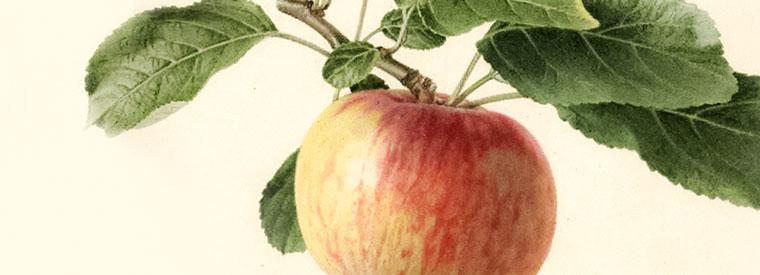Stay me with flagons; comfort me with apples.

Fruit
FAMEUSE is called Snow, or Snow Apple, and is also known as Snow Chimney, Chimney Apple, Red American, Royal Snow, Pomme De Neige and Chimney Point. Chimney Point is a village within the town of Addison, Vermont, built by the French, who likely planted the Fameuse there from seedlings or seed brought from Canada. The variety was noted in Canada in 1739, where it is also speculated to have originated in a seedling orchard from seeds brought from France. However, some European pomologists claim it originated in Canada. Snow is the probable the parent of the McIntosh. It is reported in Historic American Trees that during the American Revolution, a contingency of Hessian soldiers planted an orchard about three miles north of Winchester, Virginia, of Fameuse apple trees. Sixteen of the trees survived into the 20th century and were still bearing fruit in the 1930s. Snow is one of the few apple varieties that tend to reproduce its likeness from seed. The coloration can vary, but usually it is a solid-red or pale-yellow, flushed red, and the flesh is pure white, sometimes streaked red. It is tender, juicy and subacid. Where conditions are favorable, scab will develop. For maximum production, a pollinator is necessary. To increase the fruit color, leaves were often removed from around the best apples on the tree. The medium-size tree bears heavily, nearly annually, with vigorous growth, and produces short spurs. The bark is a dark-red, and the coarse, shiny leaves are waved with sharp serrations. It is a quality dessert, cooking and cider-making apple that ripens in late September.
Ripening Period
- Early Fall - September

